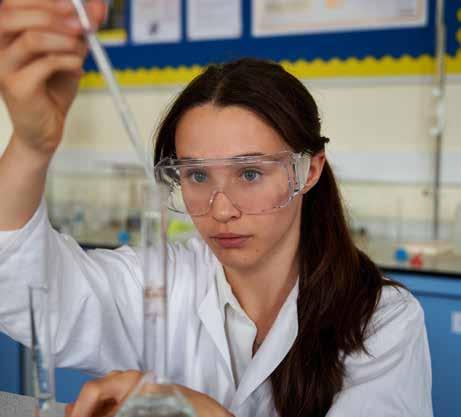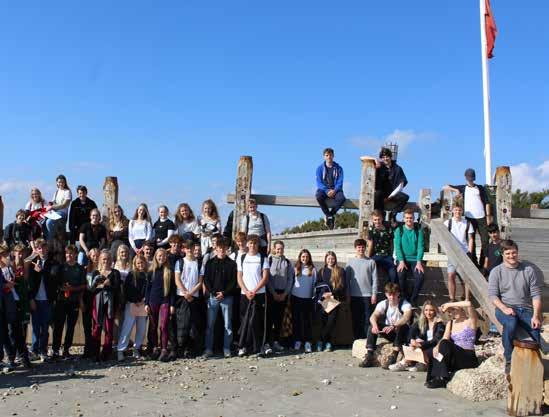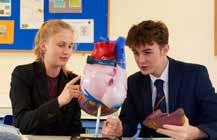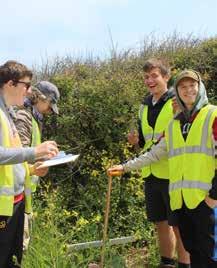
6 minute read
Science
Biology
The Department endeavoured to inspire our young Biologists with some innovative remote teaching again this year, and the experience of the first lockdown meant we could at least hit the ground running.
Students were sent out into their gardens on a flower safari, hunting for flowers of different shapes that attract pollinators of different types. They sampled tree trunks to quantify the amount of algae growing on different aspects of the trunk and undertook studies to investigate how different vegetation grows and develops over time as the soil is enhanced by added organic matter. They even conducted some fieldwork indoors, creating a complete self-sustaining ecosystem in a jam jar and creating home-made quadrats out of straws or pencils to sample organisms (beads or seeds) on the living room carpet.
BioSoc Live moved online for this year, an interactive lecture with the Fourth Year and above, which explored the importance of fat in the diet and involved tasting home-made fat free cakes!
Some core components of the Churcher’s Biology year were untouched: thankfully the First Year Gophers Club was able to continue unperturbed, undertaking interesting and fun science experiments. Unfortunately, Covid restrictions meant they were unable to play host to the Junior School Fifth Year, which is usually a highlight of the Science calendar for both them and us. The Lower Sixth were able to go on the Slapton Sands Field Trip, investigating sand dune succession, trapping moths and small mammals and going on a bat walk. And the Second Years were treated to an amazing raptor display at the end of the Summer Term by Hawkeye Falconry. A wonderful end to the year!
Ms M Westwood
Chemistry
Chemistry lesson plans were reorganised before the start of the year to maximise the amount of practical work we did in the first half of the Autumn Term, just in case there was another lockdown. This proved to be a good decision and the subsequent lockdown put paid to some of the more practical teaching, including the Chemistry of Art sessions for the Fifth Year.
Cosmetics Club continued in the Autumn Term despite all the restrictions, although it did mean that the Sixth Form were not able to help as in previous years. Some enthusiastic Second Year pupils made soaps, lip balms, body butter and more. In the Summer Term, the Second Year academy group learnt about gunpowder and other explosives. For obvious reasons practical work and demonstrations in this area are more limited, but pupils were able to investigate aspects of explosives such as the role of oxidising agents, the difference between substances burning and exploding, and the difference in power output when the same fuel burns or detonates.
ChemSoc has grown this year under the guidance of Mr Chen. Aimed at the Sixth Form to provide them with a forum to investigate, present and discuss Chemistry ideas beyond the scope of the A Level course. The enthusiasm of the students made it a real high point of the week.
The Chemistry Olympiad is aimed at the most able Upper Sixth students, although it is open to the Lower Sixth, too. The aim is used to select the best four students in the country to form the UK schools’ team which competes in the International Chemistry Olympiad. This year it was held remotely with staff invigilating remotely via Teams. 7,160 of the best A Level chemists entered this year with the top 635 (8.9%) awarded a Gold certificate, the next 1,663 a silver and the next 2,356 a Bronze. Over a third of those that entered did not achieve a certificate.

This year we had more than a quarter of our Lower Sixth students asking to do the exam, despite only having completed a term of the A Level course, in addition to three students from the Upper Sixth. Lucy Jacson and Jacob Tutt were awarded Gold, Hari Tote, Emily Killing and Santiago Clements-Rodriguez received Silver and seven more Lower Sixth students achieved Bronze. These excellent results bode well for next year when many of these students will have done another year of Chemistry.
Dr D Dunster
Physics
Locking down at a different stage in the academic year of 2020-21 meant the Physics Department had to think creatively about remotely teaching a different aspect of the curriculum. We were able to replace some of the practical work with PhET computer simulations across all years, while other practicals were simply re-imagined, transferring the laboratory to the student’s kitchen! Hooke’s Law was tested using elastic bands instead of springs and water bottles with differing levels of water as weights. Straw structures helped them investigate design and forces on bridges and tall buildings. The Second Years undertook some project-based work under the ‘I Robot’ theme to learn about design and electricity. Remote learning proved no barrier to academic success, with the Olympiad and SATRO challenges proving fertile ground for Churcher’s students to exercise their competitive spirit. In the British Physics Olympiad (BPHO), Seb Kelson came out in the top 17% in the country, with a further seven Upper Sixth students hitting the top 28%. Most of them leave us to pursue Engineering, Physics or Natural Science at University.
The SATRO Problem Solving Challenge sees schools from across the country compete to solve a tricky engineering problem using nothing more than their wits, ingenuity and a box of handy materials. This year, the required equipment was issued directly to the schools, allowing each to host its own ‘virtual’ challenge. Three teams, representing the Second and Fourth Years and the Lower Sixth, competed against others in the same age group to design and build a device to allow an electric motor to move in a horizontal circle, moving only due to the force exerted by a propeller attached to the motor. The propeller itself, along with all the supporting structure, would have to be manufactured from some basic materials and ready to test in just 90 minutes. As the teams headed home it was hard for anyone to know whether the scores they had achieved were above or below par, but just after the end of term we received the welcome news that both our Second Year and Lower Sixth teams had emerged as victors in their categories!
One of the first trips to be allowed to resume on our return to school was the annual visit to the Planetarium, a rite of passage for our First Year Physicists and one which last year’s cohort regrettably missed (although they are booked to go this year).
With the cancellation of the Summer external exams, our GCSE and A Level students were treated to bridging courses to help them with the transition to the next stage of their studies. At GCSE, these included practical investigations: calculating CD and DVD storage capacity using lasers, investigating the behaviour of springs in different combinations to find a value for gravity and using video analysis software to investigate projectile motion. At A Level, they built water clocks and investigated extended relativistic effects like time dilation and length contraction.


Mr M Kelly










